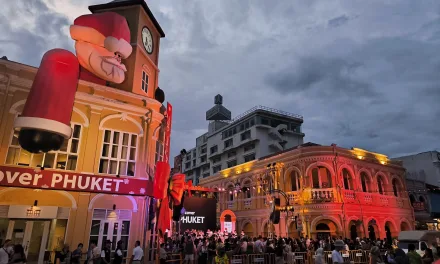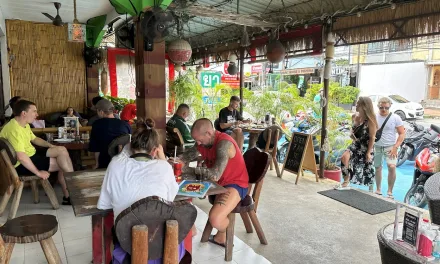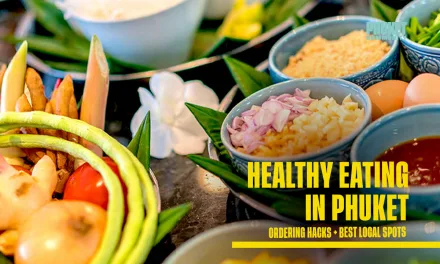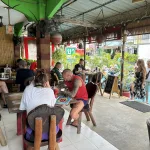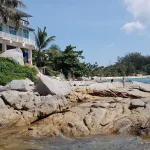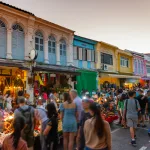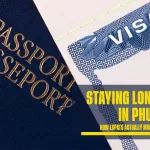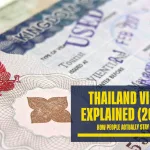Table of Contents
Table of Contents
🧭 Introduction
Phuket might be world-famous for its beaches and resorts, but there’s a whole other side to the island that doesn’t show up in glossy travel brochures. Behind the beachfront cocktails and day tours is a vibrant, ever-growing community of people who’ve chosen to call Phuket home — not for a week, but for the long haul.
This guide is for you if you’re thinking about living in Phuket — not just visiting. Whether you’re a digital nomad chasing warm weather and strong WiFi, a retiree looking for a slower pace of life, a young family searching for a safe, sunny home base, or a couple planning a long stay — this guide will walk you through what real life on the island looks like.
We’ll cover the practical stuff (visas, rentals, healthcare, schools), the lifestyle side (where to live, how much things cost, how to make friends), and a few things you won’t find on TripAdvisor — the culture quirks, the workarounds, and the unexpected perks of living here.
What we won’t do: sugarcoat it. Phuket is beautiful, but it’s not perfect. This isn’t a sales pitch. It’s the guide we wish we had when we first landed — straightforward, experience-based, and designed to help you feel at home faster.
👉 Want more local insights each week? Subscribe to our newsletter or grab our free PDF: The Phuket Expat Starter Kit — packed with tips, area guides, and setup checklists to get you settled.
🏠 Best Areas to Live (For Expats)
Phuket isn’t a single city — it’s a collection of villages, beach towns, and growing neighborhoods, each with its own energy. Choosing where to live on the island is one of the most important decisions you’ll make as an expat. The right area can shape your whole experience.
Here’s a breakdown of some of the most popular spots, based on lifestyle — not just location.
🌴 Rawai & Naiharn
Vibe: Laid-back, beachy, long-stay expat central
Best for: Families, retirees, digital nomads, café lovers
Why it works: Great mix of quiet neighborhoods, international cafés, and a local feel. Near some of the island’s best beaches (Naiharn, Ao Sane).
Heads up: You’ll probably want a motorbike or car here. Less walkable.
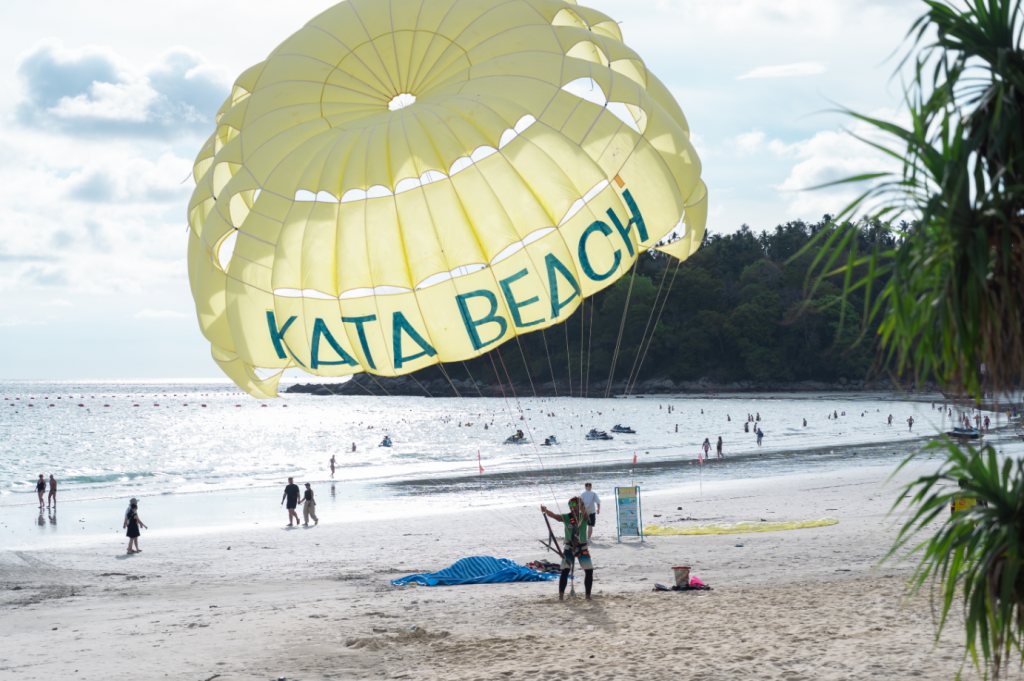
🏄 Kata & Karon
Vibe: Surf-town energy with a holiday buzz
Best for: Solo travelers, active expats, couples
Why it works: Beachfront access, walkable zones, lots of restaurants and gyms.
Heads up: Gets busy during high season. Rental prices rising.
👨👩👧 Bangtao & Laguna
Vibe: Polished, upscale, family-focused
Best for: Young families, long-term couples, remote workers with a bigger budget
Why it works: International schools nearby, coworking spaces, beach clubs, safety.
Heads up: Expect to pay premium prices.
🛵 Chalong
Vibe: Practical hub, slightly chaotic but central
Best for: Budget-conscious expats, Muay Thai fans, drivers
Why it works: Good access to Rawai, Kata, and Phuket Town. Affordable long-stay housing.
Heads up: No real “town center” — can feel a bit patchy.
🎨 Phuket Town
Vibe: Cultural, creative, historic
Best for: Artists, foodies, remote workers, non-beach lovers
Why it works: Walkable streets, colonial charm, great cafés, markets, and community events.
Heads up: No beach nearby. More rain during monsoon.
🍹 Patong
Vibe: Nightlife, neon lights, non-stop buzz
Best for: Party people, short-term expats, hotel managers
Why it works: You’ll never be bored. Super central for everything.
Heads up: Loud. Touristy. Not for everyone.
🧘 Kamala
Vibe: Peaceful, upmarket, slower pace
Best for: Retirees, families, people who value calm
Why it works: Quiet beach, village vibe, close to Patong without the noise.
Heads up: Limited nightlife and dining options.
📍 Quick Tips:
- No car? Stick to Kata, Karon, or Phuket Town for walkability
- With kids? Look near international schools in Bangtao or Chalong
- Solo? Rawai, Kata, and Town all have built-in communities
- Quiet life? Try Kamala or Naiharn
🗺️ Want a deeper look? Check out our guide to the Best Neighborhoods to Live in Phuket, including a downloadable area map.
💸 Cost of Living in Phuket (2025)
One of the big reasons people move to Phuket? The lifestyle-to-cost ratio is hard to beat — especially if you’re coming from a major Western city. But while Phuket can be affordable, it’s not necessarily cheap. Your cost of living will depend a lot on where you live, how you move around, and how much local vs. imported stuff you rely on.
Here’s a rough breakdown of what to expect — in round numbers — so you can plan accordingly.
🏠 Accommodation
- Basic studio or 1-bed apartment: ฿10,000–฿20,000/month
- Comfortable 1–2 bed condo or house: ฿20,000–฿40,000/month
- Villa with pool or large family home: ฿40,000–฿80,000+/month
💡 Prices depend heavily on location, season, and contract length. Long-term rentals are usually much cheaper than Airbnbs.
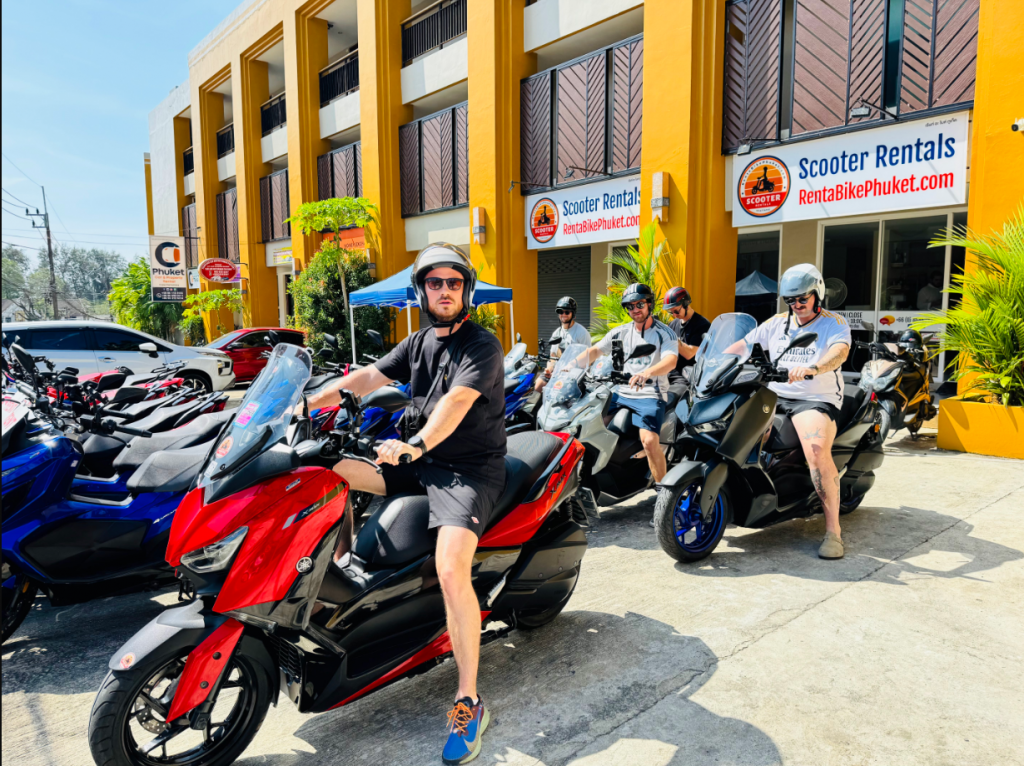
🛵 Transport
- Motorbike rental: ฿2,500–฿4,000/month
- Car rental: ฿10,000–฿25,000/month
- Grab or Bolt rides: ฿300–฿700 per trip depending on distance
💡 Most expats get a scooter — it’s the fastest and cheapest way to get around.

🍜 Food & Groceries
- Local Thai meals: ฿60–฿120 per dish
- Mid-range Western meal: ฿250–฿500 per person
- Monthly groceries (mixed local/imported): ฿8,000–฿15,000/month
💡 Imported items (cheese, wine, cereal, etc.) cost more — shop local to save.
💡 Utilities & Internet
- Electricity: ฿1,500–฿6,000/month (more with aircon use or add 3-5k for a pool)
- Water: ฿100–฿300/month
- Internet (home fiber): ฿500–฿1,000/month
- Mobile phone plan: ฿200–฿800/month
💡 WiFi is generally fast and reliable in most areas.
🩺 Healthcare & Insurance
- Clinic visits: ฿500–฿1,500 depending on service
- Hospital outpatient visit: ฿2,000–฿5,000+
- International insurance (monthly): ฿3,000–฿10,000+
💡 Many expats pay out-of-pocket for basic care and use insurance for big stuff.
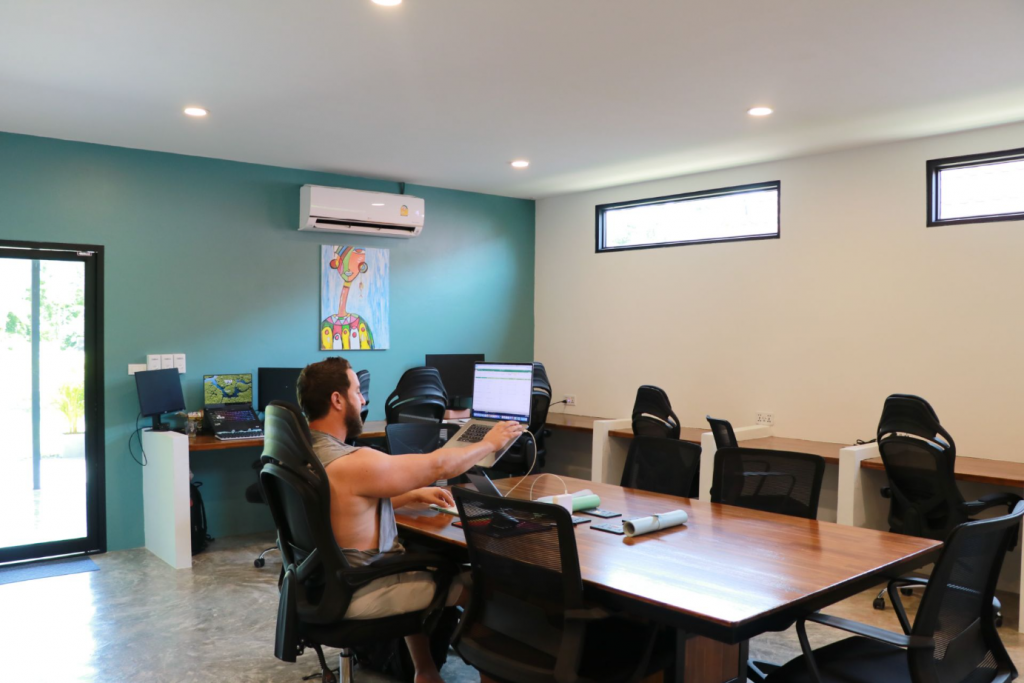
💻 Coworking & Fitness
- Coworking space pass: ฿3,000–฿6,000/month
- Gym membership: ฿1,500–฿5,000/month
- Yoga/Muay Thai drop-in classes: ฿300–฿500 per session
💰 Estimated Monthly Budget Ranges
| Lifestyle | Estimated Monthly Budget |
| Basic & local | ฿30,000–฿50,000 |
| Mid-range comfort | ฿50,000–฿100,000 |
| Premium lifestyle | ฿150,000+ |
💡 These are ballpark ranges — everyone spends differently. The key is knowing where to splurge and where to save.
Need a more detailed breakdown? We’ve got a full Cost of Living in Phuket article that walks through all the numbers — plus a downloadable budget template if you’re into spreadsheets.
✈️ How to Move to Phuket
Moving to an island might sound like a dream — and it can be — but there are some real-world logistics to get through first. From visas and housing to banking and SIM cards, setting yourself up in Phuket is totally doable… as long as you know what to expect.
Here’s a general roadmap to help you land on your feet:
🛂 Visas for Long-Stay Expats
There’s no “one size fits all” visa for Phuket, but here are some of the most common options:
- Tourist Visa (TR + extension): Short-term stays with extensions
- Education Visa: Enroll in a language school, Muay Thai gym, or course
- Retirement Visa: For those 50+, with proof of income or savings
- Marriage Visa: If your partner is Thai
- Elite Visa: Long-term option with a higher price tag but lots of perks
💡 Rules change often — work with a local visa agent or check with the Thai immigration website for the most up-to-date info.
👉 Read more in our full Visa Guide for Expats
🏠 Finding a Place to Live
You can find rentals easily on Facebook groups, RentHub, or through local agents. Monthly prices vary by area, season, and contract length.
- Long-term rentals are much cheaper than short-term stays or Airbnbs
- You’ll usually pay a deposit (1–2 months) and rent in cash or via Thai bank transfer
- Most places come furnished — but quality varies
💡 Avoid committing before you arrive. Book a short-term place for your first week and explore neighborhoods before signing anything.
👉 Our How to Rent in Phuket guide breaks it all down.
📦 Shipping or Buying Furniture?
If you’re staying long-term or moving with a family, you might wonder whether to ship your stuff or buy it here.
- Shipping can be expensive and slow, but good for full households
- Buying locally is usually easier — with stores like IKEA, Index, and local markets
💡 Even if your place is “furnished,” you’ll likely need a few extras.
👉 Learn more in our Furniture Setup Guide
💳 Banking & SIM Cards
Once you’re settled, you’ll likely want:
- A local SIM card (AIS, True, or DTAC) — easy to get at the airport or 7/11
- A Thai bank account for paying rent, transfers, and mobile banking
- Some banks are easier than others for foreigners (try Bangkok Bank or Kasikorn)
- You may need a valid visa and local address
- Some banks are easier than others for foreigners (try Bangkok Bank or Kasikorn)
💡 You can also use apps like Wise or Revolut for international transfers.
👉 We cover this in more detail in our Banking & Connectivity Setup Guide
📥 Our #1 Tip for Moving Here
Take your time. Don’t try to sort everything before you arrive. Phuket is the kind of place where you learn by doing — and most things are easier to figure out once you’re here and talking to locals.
🧳 How to Settle In Quickly
Once you’ve unpacked your bags and figured out how to unlock your front gate (they’re always tricky at first), it’s time to actually settle in. These are the small, practical steps that help Phuket start to feel like home — faster.
👥 Join the Right Facebook Groups
Facebook is still the main hub for finding people, asking questions, and discovering events. A few good ones to start with:
- Phuket Expats
- Phuket Digital Nomads
- Buy/Sell/Trade groups (for scooters, furniture, etc.)
- Local area-specific groups (e.g. “Rawai Noticeboard” or “Bangtao Community”)
💡 Keep posts friendly and respectful — Thai admins often moderate firmly (and fairly).
📱 Download the Must-Have Apps
Your phone will become your Swiss Army knife here. Start with:
- Grab / Bolt / InDrive – Ride apps
- Foodpanda / Robinhood – Food delivery
- Line – Messaging app used for everything
- Google Translate – Lifesaver in markets or pharmacies
- Mobile banking – Thai bank apps are slick and powerful
👉 Need help getting a SIM or WiFi? Check our setup guide here
🛍️ Get the Basics Sorted
- Groceries: Makro, Lotus’s, and Big C are your go-tos for bulk + local
- Fresh food: Morning and night markets are everywhere (and way more fun)
- Household needs: HomePro, Index Living Mall, or even Mr. DIY
- Cleaning & laundry: Affordable laundry services are on nearly every corner
📅 Attend Local Events (Yes, Even if You’re Introverted)
Markets, beach cleanups, coworking mixers, open mics — it only takes one or two friendly faces to change your week. Start small:
- Check Facebook or our weekly events roundup
- Coworking spaces often post what’s happening
- Say yes to the coffee invite, even if you don’t know anyone yet
💡 Island life is easier when you don’t try to do it all alone.
🤝 Be Patient With Yourself
It’s normal to feel a little out of place at first. You’re learning a new rhythm, language, and way of living. Give it time. Laugh at the weird stuff. Ask questions. Make mistakes. And if you’re feeling stuck — you’re definitely not the only one.
📥 Want a first-week checklist? We’ve put together a free printable that covers what to do in your first 7 days — from setting up your phone to finding your first local lunch spot.
👉 Download the Phuket Expat Starter Checklist
🏥 Healthcare & Insurance for Expats
One of the pleasant surprises for many newcomers is just how good the healthcare can be in Phuket — especially if you’re used to long waits or sky-high medical bills back home. That said, there are some quirks to know about the local system, and having the right setup can make a big difference if something unexpected happens.
🏨 Private Hospitals
Phuket has several private hospitals with English-speaking staff and international standards of care. These are your go-tos for anything serious, from emergency care to scheduled surgeries.
Well-known private hospitals:
- Bangkok Hospital Phuket – large, full-service, premium pricing
- Dibuk Hospital – mid-range, good for diagnostics and outpatient
- Mission Hospital – more affordable, slightly older facilities
- Siriroj International (formerly Phuket International) – expat-friendly, solid care
💡 You can usually walk in or make same-day appointments. Costs are reasonable for most services — but get insurance for anything major.
🏥 Clinics & Pharmacies
For everyday stuff — fevers, infections, stomach bugs, etc. — most people go to local clinics or pharmacies.
- Clinics often cost ฿500–฿1,500 per visit
- Pharmacists are super helpful and often prescribe basic meds on the spot
- Many meds that require prescriptions back home are available over the counter here
💡 If it’s minor, you probably don’t need a hospital. Ask a local expat group for trusted clinic recs in your area.
🩺 Insurance Options
Not everyone has insurance in Phuket — but you’ll want something in place for bigger issues.
Types of coverage:
- Travel Insurance: Fine for short stays, but often has limits
- Expat Health Insurance: Monthly or annual plans with coverage in Thailand
- Thai Insurance Companies: Can be more affordable, but policies are often in Thai
Providers like SafetyWing, Cigna, Pacific Cross, and Aetna are popular with expats.
💡 Check if your plan includes direct billing with major hospitals — otherwise, you’ll pay upfront and claim later.
🚨 Emergencies
- Emergency number (ambulance): 1669
- Ambulance response can be slow in some areas — it’s common to drive yourself to the hospital if possible
- Most hospitals have 24/7 ER services
🧠 Pro Tip:
Keep a photo of your passport, visa, and insurance card saved on your phone. You’ll need these for most hospital check-ins.
👉 Need help deciding what kind of insurance you need? Our Phuket Healthcare & Insurance Guide has tips, provider links, and a handy comparison table.
💻 Working Remotely from Phuket
If your laptop goes where you go, Phuket can be a pretty amazing place to base yourself. Warm weather, reliable WiFi (mostly), an affordable lifestyle, and a growing remote work scene all make it attractive for digital nomads and remote professionals alike.
But it’s not Bali. Phuket has its own rhythm — and some unique things to know before you set up shop.
🖥️ Can You Work Online Legally?
Here’s the grey zone: Most expats working online are technically not “employed in Thailand,” so they operate under tourist, education, or long-stay visas.
- There is no official digital nomad visa (yet), though updates are always possible
- If you work online quietly (e.g., freelancing or managing your own business), many nomads use an education or elite visa
- If you’re setting up a business in Thailand or hiring locally, you’ll need a company structure and work permit
💡 Talk to a local visa expert for the latest — or check our visa guide for remote workers.
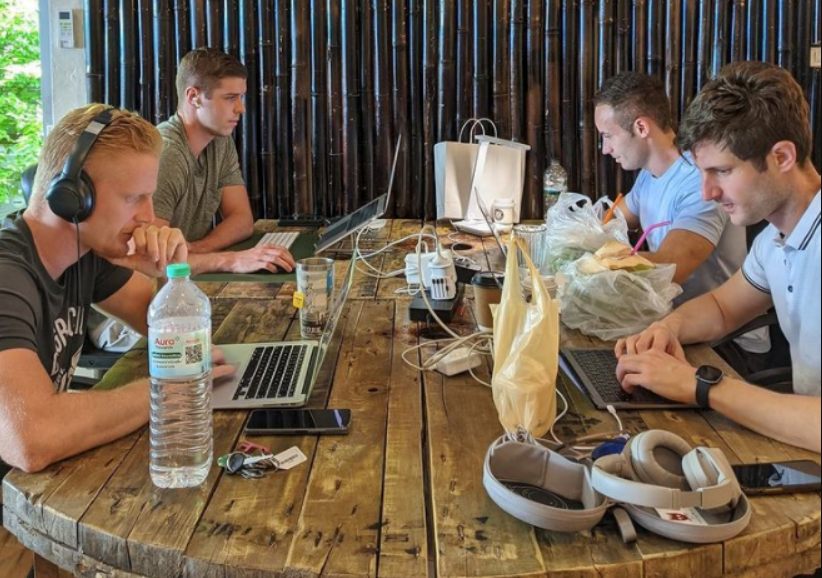
🧑💻 Best Coworking Spaces in Phuket
Coworking is growing, especially in the south and around expat-friendly hubs. Most places offer monthly passes, day rates, meeting rooms, and solid coffee.
Top picks:
- The Project (Rawai): Very comfortable & convenient workspaces
- Garage Society (Patong): Sleek space for digital nomads near nightlife
- Regus (Phuket Town / Patong): Corporate vibe, multiple locations
- Local cafes with WiFi: There are lots. Some faves include Wilsons Cafe, Coffee Tribe, Ken Ken.
💡 Most coworking spots also host events or casual mixers — great for meeting people.
☕ WiFi & Work-Friendly Cafés
If coworking isn’t your thing, café-hopping is a solid strategy. Just make sure to:
- Order something every 1–2 hours
- Avoid peak lunch times if you’re camping with a laptop
- Ask for the WiFi password politely — most are happy to help
Some cafés even have designated laptop zones and outlets built into tables.
🧠 Insider Insight:
Don’t isolate. Working online is great — but after a few weeks of solo screen time, it’s easy to feel disconnected. Join a coworking space, go to an event, or simply say hi to your barista.
Need more support or structure? Our Remote Work Guide to Phuket includes a map of coworking spots, recommended cafés, and visa options for digital workers.
🎓 Raising a Family in Phuket
Phuket isn’t just for backpackers and beach bums — it’s also home to a growing number of families who’ve chosen island life for its sunshine, slower pace, and surprisingly solid schooling options. Whether you’re here short-term or planting longer roots, raising a family in Phuket can be as enriching as it is affordable — with a few things to know upfront.

🏫 International Schools
Phuket has a range of international schools, from well-established campuses with global curriculums to smaller, alternative-style schools.
Popular choices include:
- British International School (BISP): Large, premium, British curriculum
- HeadStart International: Central location, modern, good reputation
- UWC Thailand: IB program, sustainability-focused, nature-heavy campus
- Oak Meadow / Lighthouse: Smaller, alternative learning environments
- Kajonkiet International School (KIS): Bilingual focus, more affordable
💡 Most schools run from August–June and offer mid-year enrollment.
👉 We cover tuition, admissions, and more in our full International Schools in Phuket Guide
🏘️ Best Areas for Families
- Bangtao / Laguna: Close to schools, beaches, and gated communities
- Rawai / Naiharn: Laid-back, community vibe, great for toddlers
- Chalong: Central location, near gyms, parks, and more affordable homes
💡 Consider your school run and transport needs — Phuket traffic isn’t fun at 8am.
🧸 Family Life on the Island
- Outdoor activities: Beach days, jungle hikes, swimming lessons, animal farms
- Health care: Easy access to pediatricians and clinics
- Safety: Generally very safe for children — friendly locals, lots of space
- Support: Facebook groups, WhatsApp parenting chats, school communities
🎒 Other Education Options
- Homeschooling and online school setups are becoming more common
- Many international schools offer part-time or hybrid programs
- Extracurriculars: Muay Thai, gymnastics, surfing, languages, coding, and more
💡 You don’t need to bring every toy or textbook — there are plenty of options here.
Thinking about making the move with kids? Our Phuket for Families Starter Guide includes local tips, school comparison charts, and a checklist for relocating with little ones.
🧘 Lifestyle & Community in Phuket
There’s more to island life than beaches and smoothie bowls (though there are plenty of both). What makes Phuket special for long-term residents is the mix of international energy, local charm, and do-your-own-thing freedom.
Whether you’re a gym rat, artist, entrepreneur, or someone who just likes a good sunset — you’ll likely find your people here.
🏋️ Health, Fitness & Wellness
Phuket is quietly one of the best places in Southeast Asia to stay active and well — with a huge range of options for every lifestyle.
Popular choices include:
- Gyms & Functional Training (Unit 27, Titan Fitness, Sutai Muay Thai)
- Yoga & Pilates Studios (e.g., Belove Yoga, Yoga Republic)
- Muay Thai camps – both traditional and fitness-focused
- Retreats & detox centers in Rawai, Kata, and Kamala
💡 You can be social or solo — the scene is flexible and welcoming.
🎭 Markets, Music & Events
Island life doesn’t mean missing out on culture. There’s always something happening — if you know where to look.
- Night markets & walking streets (Phuket Town, Chillva, Naka)
- Live music (places like Green Man, Blue Tree, or beach bars)
- Workshops – art, dance, language, cooking
- Community meetups – coworking mixers, beach cleanups, charity runs
👉 We round up events every week in the Phuket Community newsletter.
🤝 How to Meet People
- Start with shared interests – fitness, events, coworking, or even dog parks
- Join Facebook or WhatsApp groups in your area
- Say yes to that random invite — it often leads to your first island friend
- Coworking spaces & cafés are great for meeting like-minded folks
💡 Most expats are open and welcoming — they’ve been the “new person” too.
🧠 Final Thought
You don’t have to “reinvent yourself” to live here — but you might find yourself slowing down, showing up differently, or reconnecting with what matters most. That’s part of the magic.
Want a full list of events, groups, and places to plug in? Check out our Phuket Community Connection Guide.
❓ FAQs About Expat Life in Phuket
🛃 Can I really live in Phuket long-term?
Yes — thousands of expats do. You’ll need the right visa (retirement, education, elite, marriage, etc.), and it’s best to consult a local visa agent to stay up-to-date with Thai immigration rules. Tourist visas work for short stays, but aren’t a long-term solution.
🏥 Is healthcare in Phuket good?
Generally, yes. Phuket has several international-standard hospitals with English-speaking staff, and local clinics are convenient and affordable. For serious conditions or surgeries, Bangkok is a backup option. Many expats pay out-of-pocket for small things and keep insurance for emergencies.
🏡 How easy is it to find a rental as a foreigner?
Very easy. Most rentals are furnished and available on monthly contracts, especially in expat-heavy areas like Rawai, Kata, and Bangtao. You can start your search on Facebook, RentHub, or through local agents.
💻 Can I work remotely from Phuket legally?
It’s a bit of a grey area. Most digital nomads use tourist, education, or elite visas while working online for clients abroad. If you’re setting up a business or hiring staff locally, you’ll need a work permit. Visa rules do change, so always double-check with a local expert.
🧾 Do I need to speak Thai to live here?
No — English is widely spoken in expat areas. But learning a few Thai basics makes life easier and shows respect. Locals appreciate it even if your pronunciation isn’t perfect.
🧍 Is Phuket safe for solo expats?
Yes. It’s one of the safer places in Southeast Asia. Like anywhere, use common sense (especially at night or on the roads), but violent crime is rare. Solo women, retirees, and younger nomads all find Phuket manageable and welcoming.
🛒 Is it easy to find Western food and products?
Yes — especially in areas with lots of expats. You’ll find everything from sourdough and oat milk to imported wine and peanut butter. Just be ready to pay a little more for foreign items.
Some parts — yes. Others — not at all. Areas like Patong are full-on tourist zones, but places like Rawai, Naiharn, Kamala, and Phuket Town offer a much more local vibe. Choosing the right neighborhood makes all the difference.
🛵 Can I drive on a foreign license?
Yes — but only temporarily. You’ll need an International Driving Permit (IDP) to legally ride a motorbike or drive a car. Long-term residents should get a Thai driver’s license, which is straightforward once you have a visa and address.
🧑🤝🧑 How do I meet Thai people or make local friends?
Start with shared spaces — gyms, cafés, language classes, coworking hubs. Be open, respectful, and consistent. Building trust takes time, but it’s worth it. Learning Thai (even just a bit) really helps break the ice.
😮 What are the biggest culture shocks for new expats?
- Saving face: Confrontation is avoided — calm and polite wins
- Road rules: They’re more like suggestions (especially with scooters)
- Bureaucracy: Paper-heavy and not always logical — patience required
- “Thai time”: Things move at a slower pace — don’t fight it
💡 Go with the flow. Smile more. Expect things to be different — because they are.
🔚 Wrap-Up & Resources
Moving to Phuket — or even just thinking about it — is a big step. But you don’t have to figure it all out on your own.
Whether you’re a digital nomad, a couple on an extended adventure, a young family, or planning your retirement in the sun — there’s a version of island life here that can work for you. And it doesn’t have to start with a leap. It can start with one step — a short stay, a test run, a conversation with someone who’s already made the move.
✅ Your Next Steps:
- Subscribe to the Phuket Community newsletter — a friendly weekly email with local events, hidden gems, tips, and updates
- Download the Expat Starter Kit (PDF) — includes an area map, visa overview, setup checklist, and cost-of-living ranges
- Follow us on Instagram @phuketcommunity_com for daily stories, island updates, and new discoveries
- Check our printed map — available at over 100 local cafés and shops around the island
📣 Let’s Keep It Real
Have a question we didn’t cover? Want to share your own expat tip or experience?
📩 Message us on Instagram or reply to the newsletter — we’re a small, local team, and we actually read everything.
Thanks for reading — and welcome (or soon-to-be welcome) to Phuket. 🌴


